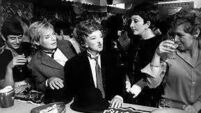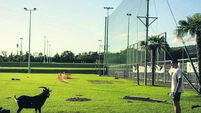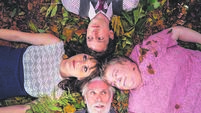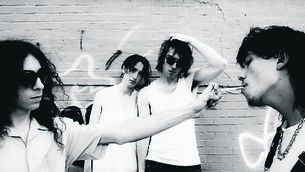Neurodivergence and art: 'A place where I can share what I'm feeling'
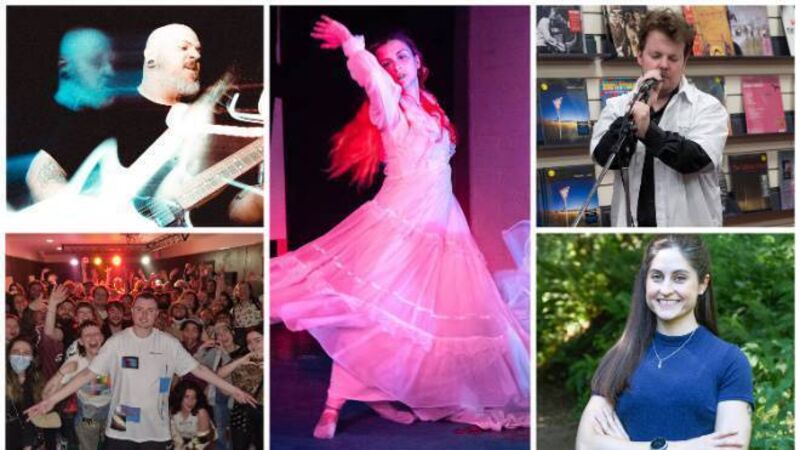
Clockwise from top-left: Worn Out guitarist Alex Heinrich; performance artist Moss Russell; singer and actor Kevin Walsh; neurodivergence coach Ailín Kennedy; rapper and producer Craic Boi Mental
"Music, for me, was always some kind of escape - an escape from my own thoughts, escape from all the influences around me. When I'm listening to music, I can immerse myself completely. When I'm creating music, I can immerse myself completely, and zone everything else out. I really start to focus on little things - when I'm writing something, it's the little things that I'm putting in place."
Alex Heinrich, guitarist of Cork hardcore band Worn Out, as well as solo sludge-metal project ABYSM, is currently in the process of seeking a formal autism diagnosis. At the outset of our conversation, he discusses how his neurological difference shapes his experience with writing and listening to music.
"ABYSM is the perfect example of that, because I wrote everything there myself, or even for Worn Out, when we record demos, I tend to focus on things that maybe other people wouldn't hear that, in the bigger scheme, wouldn't make any difference to other people.”
With recent years seeing improvements in diagnostics, as well as a wider understanding both of how neurological differences present, and how those presenting with them navigate the world, there’s a more informed and empathetic conversation being had around neurodivergence - an umbrella term for neurodevelopmental differences including autism, ADHD, dyspraxia, dyslexia, dyscalculia, Tourette’s, and other differences (see panel at the end for more).
At a time when an increasing number of adults are realising later in life that they may be neurodivergent, and going about the process of seeking consultation, assessment, diagnosis, and further support, the role of arts and culture as a place for escape, expression, and connection to like minds, cannot be underestimated.
“I think creativity is synonymous with neurodiversity, particularly ADHD,” says Ailín Kennedy, aka AilsDHD, a Cork neurodivergence coach whose own ADHD diagnosis informs her work, and a former musician. “I see that in my clients, the majority of my clients are creative in some way, and that can show up in different ways, through art, design, dance, performance, and music.”

Moss Russell is a performance artist from Cork City who works in various artistic disciplines, including dance, circus, music, and theatre. Fiercely proud of her autism and ADHD, she channels her perspective and experience into her work on stage, exploring her creative self in an ever-increasing range of ways.
Performance art is something that can really move people. Whether they love it, or they hate it, that impact has great power.
“I would say that the divisiveness of performance art is something that I feel a really strong connection to, because I feel that I can be quite divisive as a person myself. It's wonderful to have an outlet that results in lots of feedback. It's very helpful to get that external perspective, because as neurodivergents, it can be very hard for us to understand how we're perceived.
“But stage is a place where it can be quite clear - even if you don't know exactly what people are thinking, you can understand how to express yourself in that environment, so it kind of gives you this framework with which to connect to the world, and for people to connect with you in a way that words might never have done.”
“When I got heavy into production, I didn't really have much of a future. I dropped out of St. John's College, so it was either, be drinking all the time, or be making beats daily. That's all that was happening,” says West Cork-based rapper and music producer Craic Boi Mental, who openly discusses his autism and dyspraxia in his music and social media, including 2021 album ‘Autistic Legend’.
“It took up so much of my time, I went through a whole year where I was literally just making beats, just looking for samples, I wasn't going out or anything. That took up my whole energy. I actually got diagnosed soon after that.
“In many ways, the music was probably an escape from reality for many years, but I think now I've kind-of reached the point where I'm trying to put reality into the music.”
“Even just the act of singing, you can be open to communication with the people around you,” says Kevin Walsh, an autistic actor and singer from Cork with a grá for the circumstance and grandeur of musical theatre, tapping into his dual loves for debut single ‘Embrace the World’, recorded and released with a host of collaborators from across Irish arts - and other neurodivergent artists.
“We say it in musical theatre a lot, actually, it's a rule that they give writers - if an emotion is too strong for a character to say something, then they sing it.”
For many neurodivergent people, differences in learning styles, concentration and natural aptitudes can shape the way someone hones and practices their craft.
“Even when I was at school, my friends and I were always reenacting Star Wars and anime scenes in the playground, so the act of taking a character and memorising the dialogue comes very naturally,” says Kevin of his tendency toward musical theatre. “A lot of it is through imagination, and you're guided by the intention of the character you're portraying, what they're doing.
“This is a very interesting point to neurodiverse people - a lot of the time [when we're younger], we're taught a social script [in everyday life] - inhabiting a role, playing a character - we do a lot of roleplay in school.”
In contrast to the ability of some to learn instruments or techniques in the abstract, focusing and practicing alone before bringing them to classes and collaborators, others flourish in having a structured and understanding environment in which to learn and explore on the job - seeking to “body-double”, or work in the company of others for motivation, collaboration and learning.

“When I picked up bass, I literally just learned s**t by ear, and just joined in because I was around so many musicians,” says Ailín. “Y'know, that's the learning style, and I think the body-doubling aspect is just huge, it really, really is. I didn't start creating as much 'til I met people like me, who were mostly neurodivergent people, to be honest.
“We have so many ideas, and sometimes it can be hard to get to those ideas, because you have all of our executive functioning [issues] and [neurotypical] expectations. But when you collaborate with other people, that can really help us to be seen, and turn on the motivation.”
"I think that I generally respond quite well to a class environment, but sometimes it goes the opposite direction,” says Moss. “Sometimes though, I'll find myself having a meltdown. So I guess that really depends on the teacher, and how well they're reading the room, so to speak.
“But certainly, when I was younger, at children's dance classes, the environment suited me, actually, quite well, because there was a clear structure, and a clear framework to follow, and it was quite guided. As you might guess, at the end, the teacher might put on three minutes of music for free movement, and that was your creative time, but the rest of the time, there was a structure. You're not left to your own devices, and your own anxieties, wondering, ‘am I doing it right?’.
"Now, as an adult, outside of [a class] structure, in my own personal process, one of my big strong suits would be pattern recognition. So in devising my own art, and in having an artistic eye that has been educated by years of watching performance, each one has fed into my pattern-seeking brain. It means that I have a very strong eye for what works on the stage, what doesn't work on the stage, what could connect with an audience, what might not connect with an audience. I find that I'm a good sounding board for other creatives, as well.
Alex’s experiences in the band rehearsal rooms differ slightly - preferring to work on musical ideas at home where he has the time and space to engage with them in detail, and presenting them to his bandmates to collaborate on at rehearsals.
“When I started to play guitar or other instruments, it came pretty easy to me, I didn't have to put much effort into it. What I also noticed over the years, like, when I was younger, it was easier for me to do things in a collaborative way, but more and more, I realised I need to do this on my own - really hammering down what I'm doing, what I'm writing, picking it apart, putting it all back together.
“It stresses me out when I have people around me, we're just waiting, 'okay, let's jam something, let's play something". Maybe one or two times, we started something in a rehearsal room, but every time I feel like 'this is really a fight for me, here'.
“This is nobody's fault at all, right, but this is more like getting my ideas across, when I'm playing something, when I'm writing something, that I know right away: 'okay, I can do so much better, when I can just have some peace here, and just completely focus on this, and completely lose myself in it.”
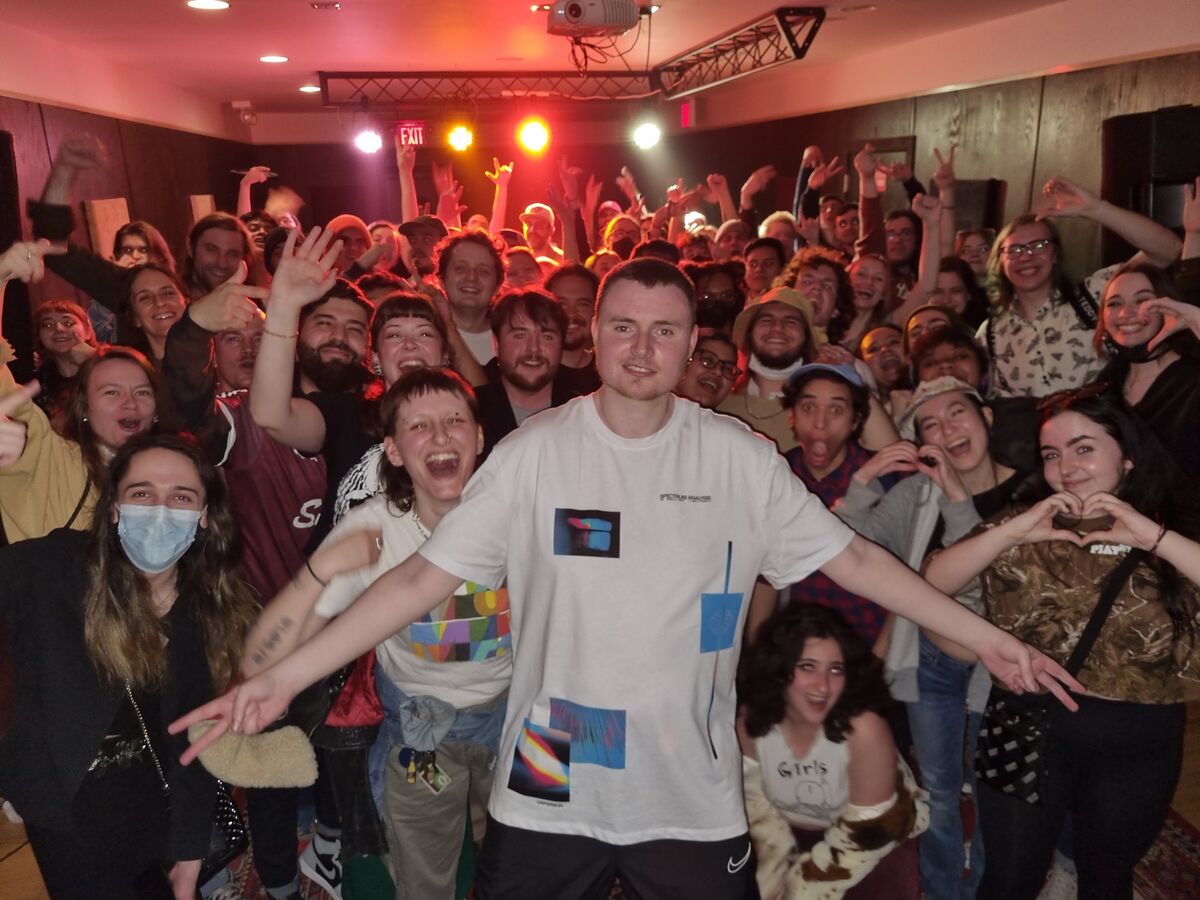
Hyperfocus is a commonly-experienced aspect of neurodivergence that can often feed into creative flow when applied to an area of an individual’s interest - fully lending one’s time, attention and perception to a work or project, in bursts of fully-engaged concentration and engagement.
“I always work in albums, y'know, I never just do one song. I'll make eight beats that sound cohesive. Not that they all sound the same, but, you need a certain style for a certain album, that's how I feel,” opines Craic Boi, on the album process.
“I can spend a few months just going through samples to find stuff that I want the album to sound like, then I'll make you know, the eight, ten, twelve beats, depending how long the project is. Then after that, really, it's just coming up with catchy hooks that go with each piece.
“To be honest, over the last while, I've been trying to analyse how I go about the music, because I think, once I have something in my head that I want ten tracks on this album, I'll make the ten beats, but then maybe there's three or four tracks where I'm like, 'I don't really have anything for this', but I've kind-of said now that I'm doing this, and sometimes it can end up not being the best material.”
“Being an ADHD person means that my mind can operate at extremely high speeds, and that, combined with the pattern-finding means that, generally speaking, I'm quite lucky to say that coming up with ideas isn't a problem for me - that they kind of just flow out to me at a high rate,” says Moss.
“If I'm in the early stage of a creative process in a group I'll find myself spitting out a lot of ideas in comparison with other people, and I don't mind if they're getting shot down - I really love that early stage when things are formless and expansive. The whole thing is just so open to becoming anything. I really enjoy that end of things.
“I enjoy whittling ideas down too, and bouncing those ideas off other people, seeing what resonates with them and what doesn't. I would say that the group creative process is my favourite. I was presenting a show in the Circus Factory last week, and we wrote several of the jokes in advance - not the whole thing, it was still very much improvised.
“But in that process, y'know, it's me sitting around the table with a couple of partners, and we're discussing, like, the intricacies of what may or may not fly with an audience and making each other laugh, and that group process is something that's really, really valuable to me.”
While relating to others in a creative or focused environment can often be a boon for neurodivergent individuals, issues like reading or understanding implied social cues, or problems with executive function (doing regular or routine tasks), and emotional regulation (identifying emotions and using learned tools to manage them as they arise) can present significant barriers for neurodivergent people.
Ireland’s arts community is a small world, and forming relationships with administrators, promoters, journalists and others is an important part of it - which, as one might guess, poses significant challenges for people whose brains work differently to others’, especially in social situations.
"Dealing with people, and again, it's nobody's fault, it stresses me out. I tend to lose myself, I tend to lose my train of thought sometimes. It overwhelms me, talking to people, being around people,” says Alex.
“Usually [at Worn Out shows], I do the merchandise table. I chose to do the merch, because I can focus on my little area. I have my iPad, or whatever next to me, where I keep track of what I'm selling, and it's super-stressful for me. I can't comprehend how other people are doing it, to be around people, because I honestly cannot relax in this situation.
“People will read your anxiety or your hesitance as rudeness and find you kind-of unfriendly, and that can make it quite hard to work with people,” says Moss of the challenges presented by social differences. “Schmoozing is such a big part of my industry, and it really is generally an Achilles heel for me. It's kind-of a dice roll.
“Some days, you can be just on fire, really connected, and really connecting with people, and finding it very easy to build that network. But a lot of days, I'll find that I will be withdrawn in those kinds of situations, because I don't know whether people are going to be able to connect with me - so it's not just a matter of me connecting with them.”

“Like, I couldn't go to my key worker now with [Rehab-sponsored programme] ASPECT, and go really in-depth about the issues I might have around networking, because they'd only understand it as much as a civilian would,” says Kevin. “In the arts, there's kind of a particular set of gatekeepers, and or particular ways that they want to be approached, and not approached and that's a whole minefield in and of itself.”
"If you're really good at making connections, which is a skill at the end of the day, you have a good chance of making it," says Craic Boi of the Irish music business. "Fortunately for me, now, with the internet, you can be self-sufficient, and you can have control over what you're putting out there.
“For me, I think, knowing that I'm probably never going to fit into an industry, whether it's the Irish scene or any other scene, I think it just lets me know that I have to be consistent with putting stuff out there, whether that's music or just keeping my face out there, so when I drop the music, people will listen.
“It's that support around musicians [and artists] in Ireland, because as Irish people, it's one of our main exports,” adds Ailín, and it's something that tourists are attracted to, our arts and music culture here in Ireland - but then at the same time, it's not respected in that same breath.
“More respect and resources. Even being taken seriously, as a self-employed artist or musician - it's not taken seriously in this country. That needs to change, for all artists and musicians. It can be unstable for certain people, because there aren't the right supports there, and the right resources.”
For the disadvantages that neurodivergence can sometimes pose in a society and arts scene still adjusting to the wider conversation around acceptance of neurodivergent peoples’ communication styles and skills, those same differences also present advantages, opportunities, and a unique perspective.
“When it comes to the advantages, like it will definitely come back to creativity, having a lot of ideas, and then I would say another big advantage for me is that my social skills have been very, very hard-won, and very, very thoroughly developed,” says Moss.
“That isn't saying that if I'm feeling burned out, or not myself, that I won't make a huge social faux pas from time to time, but generally speaking, I'm going to be quite switched on and hyper-aware of other people's needs and emotions, and so that can actually create a really positive working environment.
“I feel like I have a really decent grasp on how to help a group dynamic work, how to spot when people are being overlooked in the group, and help them to feel valued. It's bottom-up processing, where to understand social things, I had to go very, very deep, and actually have support from other people who were willing to point out to me when I had been rude.
“It's been a very long process to become a person who is as friendly and polite on the outside, as my heart has always longed to be.”
"Playing on stage, playing shows, I love it. Honestly, I really love it. It's more so a catharsis for me. I don't think about the crowd,” says Alex. “I just think, okay, 'I've got my loudest amp behind me, I'm playing heavy music. I'm really exhausting myself on stage - this is for me, as much as for all the people'."

The conversation around neurodivergence is growing in wider society - and with it, neurodivergent people, their loved ones, and their advocates are hoping too for a move from an all-pervasive ‘awareness’ of neurodivergence and its presentations, as raised during fundraising campaigns, or specially designated months where issues enter and exit news cycles, etc.
The neurodivergent community seeks wider acceptance - a broader societal understanding and acknowledgement of the issues facing neurodivergent people on a daily basis, from socialising and communication styles, to sensory, cognitive and physical issues - as well as more publicly-available supports for neurodivergent people, many of which either simply do not exist, are withdrawn once a childhood-diagnosed individual turns 18, or are a matter for costly private treatment.
As far as music, culture and the arts, a similar process of conversation, understanding and accommodation undoubtedly lies ahead - and though independent promoters like Cork rock raconteurs Relapse Promotions have made specific accommodations and standing sections for neurodivergent patrons at their past events, a lot remains to be done.
“I've been playing shows for God knows how long in Germany, and in every small venue that you have there, there's always some sort of small green room where you can retreat for some peace and quiet. This is something that's not really here in Ireland, and sometimes this is what's stressing me out. Because I tend to realise when I'm on my own and being quiet for, like, 30 minutes or an hour, then it all becomes easier, more manageable for my emotions.
“There are a lot of people playing in bands who are neurodivergent, and sometimes it's really just [a case of] getting through the day, getting through the evening, even though they enjoy it. I really enjoy playing shows, and doing all of it, but it can be a bit much. Keep that in mind.”
“I would say that neurodivergence is deeply inherent in our industry, and that connection needs to become more explicit,” says Moss.
“Any industry right now is needing sensitivity training, in all areas for racism, homophobia, sexism, those types of trainings have always been there, and to see a rise in trainings of how to connect better with neurodivergent people, and to have less stigma around communication differences would be really wonderful.
I would find that generally in society, people can be quite averse to that depth of conversation, but having an openness to deep communication, I think could be very, very helpful.
“The more people who understand that they're neurodivergent, and can be honest about that fact, the more normalised it's going to become in the industry so that it could be explicit, cohesive, fully integrated. We could have much happier, healthier creatives if they felt seen, understood and accepted.”
“Just recognise that autistic people socialise differently, and they shouldn't be punished for that in the industry,” concludes Craic Boi.
“Quickly, people will make you out to be a burden on the industry as well. It's kinda like, be sound, keep your head down, smile at people, don't put up a fuss. Now, that's the opposite of what I've been over the last six or seven years [laughs].
“So yeah... don't punish people for having a social disability, reward them for what they've achieved. Just be fair, really be fair, with autistic people. That's what I think.”

is a non-medical umbrella term, coined by US sociologist Judy Singer, for separate or coinciding neurological differences that diverge from neurotypical understandings of the world around us - our understanding of neurological difference is continuing to grow, and includes more differences than those listed below.
is understood as a genetic neurological and developmental difference. The way an autistic person communicates, interacts, and understands other people, and the world, is different to those who do so typically.
is a genetic neurobiological difference in which the brain’s neurotransmitter chemicals, noradrenalin, and dopamine, do not work properly.
, or , is a complex neurological difference affecting fine and/or gross motor skills, motor planning, and coordination, which can sometimes affect cognitive skills.
is a learning difference that specifically affects reading, spelling, writing, and related cognitive/processing difficulties. specifically affects intuition with numbers, mathematics, and numerical operations.
These differences can impact different people, in different ways, to differing degrees, at different times, and in different situations, and require differing degrees of support and accommodation.
These impacts can be ameliorated, and natural aptitudes emphasised, with proper identification, treatment/management, and supports such as neuroaffirmative therapy, coaching, peer support, and, where appropriate, medication, in hand with wider societal acceptance of neurodivergent communication styles and behaviours.
